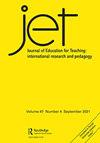The teacher educator: pedagogue, researcher, role model, administrator, traveller, counsellor, collaborator, technologist, academic, thinker ………. compliance or autonomy?
IF 1.7
3区 教育学
Q2 EDUCATION & EDUCATIONAL RESEARCH
引用次数: 0
Abstract
The title of this editorial would have probably been longer than the text had all the attributes and roles of the teacher educator been fully listed. A brief glance at those above will convince the reader that teacher educators across the globe are poised on a professional continuum between compliance and autonomy. Subject to continuous policy churn, teacher educators strive to fulfil imposed frameworks and inspection regimes whilst, in the spirit of upholding teaching as an intellectual activity, maintaining their academic autonomy (la Velle and Reynolds 2020). In the UK, where this situation is particularly acute, the Universities Council for the Education of Teachers has put out a position paper entitled The Intellectual Base of Teacher Education (UCET 2020), which, as well as providing a clear argument for the importance of a university education for teachers, has been used as a response to increasingly prescriptive government initiatives. That the profession of teaching should be research-informed is a basic premise of education. The UCET position is an articulation of this and arose via a framework for research-informed teacher education (UCET 2019), which in turn was based on a report on research and the teaching profession from the British Educational Research Association (BERA 2014). The professional tension that characterises the working lives of teacher educators extends to their own engagement with research (la Velle et al. 2022) both as consumers and producers of research operating within an environment of increasing accountability. In this first issue of JET of 2023, the opening article, by Ciarán Ó Gallchóir and Oliver McGarr, both actively researching teacher educators in the University of Limerick in Ireland, addresses the issue of accountability to policy-driven standards/codes of professionalism and how this is communicated to student teachers. Findings were that teacher educators, wishing to help their students to embrace the professional culture of teaching, in doing so may be enacting elements of power and conformity. Teacher educators’ professional agency is discussed in the light of this. A thoughtful and carefully researched study, this contribution highlights another professional hazard and potential source of criticism for the teacher educator. Professional development (PD) of teacher educators is the theme of the next article, from Katriina Maaranen and her colleagues from the University of Helsinki in Finland. These teacher educator researchers interviewed faculty of education leaders (Deans and Directors) about their understanding of PD for teacher educators. Most interestingly, although supportive of the notion, these pedagogic leaders did not have a clear view of what this PD should constitute; instead, they related it to the teacher educators’ own research, citing their autonomy as a major factor. Whether this is a reflection of the nonJOURNAL OF EDUCATION FOR TEACHING 2023, VOL. 49, NO. 1, 1–4 https://doi.org/10.1080/02607476.2023.2172664教师教育者:教育者、研究者、榜样、管理者、旅行者、顾问、合作者、技术专家、学者、思想家..........遵从还是自主?
如果把教师教育的所有属性和角色都列出来,这篇社论的标题可能会比正文长。简单地看一下上面的内容,读者就会相信,全球的教师教育工作者都处于服从和自主之间的专业连续体上。受持续的政策变动影响,教师教育工作者努力履行强加的框架和检查制度,同时本着坚持教学作为智力活动的精神,保持他们的学术自主权(la Velle和Reynolds 2020)。在英国,这种情况尤为严重,大学教师教育委员会发布了一份题为《教师教育的知识基础》(UCET 2020)的立场文件,该文件不仅为大学教育对教师的重要性提供了明确的论据,而且已被用作对日益规范的政府举措的回应。教学专业应具有研究性,这是教育的基本前提。UCET的职位是对这一点的阐述,并通过研究型教师教育框架(UCET 2019)产生,而该框架又基于英国教育研究协会(BERA 2014)的一份关于研究和教学专业的报告。教师教育工作者工作生活的专业紧张关系延伸到他们自己与研究的接触(la Velle et al. 2022),他们既是研究的消费者,也是研究的生产者,在一个日益问责的环境中工作。在《JET》2023年第一期中,由Ciarán Ó Gallchóir和Oliver McGarr撰写的开篇文章探讨了政策驱动的专业标准/规范的问责问题,以及如何将其传达给实习教师。他们都在积极研究爱尔兰利默里克大学的教师教育。研究发现,教师教育工作者希望帮助他们的学生接受专业的教学文化,这样做可能会产生权力和从众的因素。在此基础上探讨了教师教育工作者的专业代理问题。这是一项经过深思熟虑和仔细研究的研究,它突出了教师教育的另一个职业危险和潜在的批评来源。教师教育工作者的专业发展(PD)是下一篇文章的主题,来自芬兰赫尔辛基大学的Katriina Maaranen和她的同事。这些教师教育研究人员采访了教育领导学院(院长和主任),了解他们对教师教育工作者PD的理解。最有趣的是,尽管支持这一概念,但这些教育学领袖对这种PD应该构成什么并没有明确的看法;相反,他们将其与教师教育者自己的研究联系起来,认为他们的自主性是一个主要因素。这是否反映了非《教育教学期刊》2023年第49卷第1期。1,1 - 4 https://doi.org/10.1080/02607476.2023.2172664
本文章由计算机程序翻译,如有差异,请以英文原文为准。
求助全文
约1分钟内获得全文
求助全文
来源期刊

Journal of Education for Teaching
EDUCATION & EDUCATIONAL RESEARCH-
CiteScore
10.50
自引率
10.00%
发文量
61
期刊介绍:
The Journal of Education for Teaching is an established international refereed periodical which publishes original contributions on the subject of teacher education. The journal interprets "teacher education" in the widest sense, to include initial training, in-service education and staff development. The editors welcome scholarly discussions of new issues, reports of research projects or surveys of research work in particular fields, and contributions to current debates in teacher education throughout the world, generally or on specific issues.
 求助内容:
求助内容: 应助结果提醒方式:
应助结果提醒方式:


